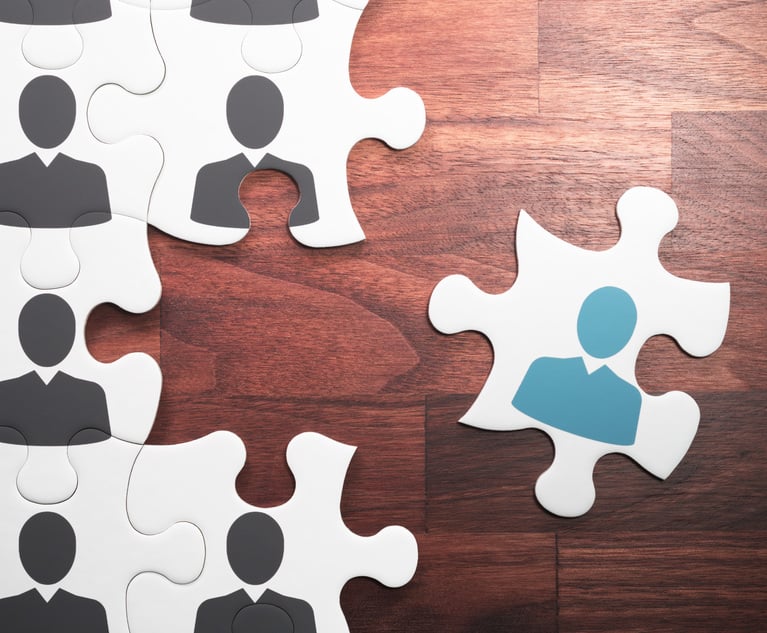Is Menopause the Last Taboo for Women in the Law?
Despite the challenges it presents to many senior women in Big Law, firms largely lack a plan to tackle the issue.
February 28, 2020 at 02:00 AM
7 minute read
The original version of this story was published on The American Lawyer
 Credit: fizkes/Shutterstock.com
Credit: fizkes/Shutterstock.com
Society has largely accepted the very real blockades women face every day at work and beyond. Senior women in Big Law have likely battled discrimination and harassment—often while raising children—to get to where they are now.
But at this stage in their careers, women will face yet another gender-specific challenge: menopause.
The average age for the onset of menopause in developed countries is 51, according to Stephanie Faubion, medical director of The North American Menopause Society. Many women this age and over will experience debilitating symptoms such as wildly fluctuating temperature, insomnia, short-term memory problems and anxiety as a result of the natural change in their bodies, when their estrogen hormone levels drop. The symptoms present a new challenge for many lawyers and their firms to contend with.
The U.K. legal market appears to be ahead of the U.S. market in helping lawyers deal with menopause. Several U.S. firms, including Baker McKenzie and Reed Smith, declined to provide information on how they tackle the issue or whether they recognize its significance.
Lindsay Paterson, a former lawyer based in the U.K. who now provides professional coaching and mentoring, says her own experiences have helped her advise individuals and companies about how to deal with menopause. She describes having "anxious reactions to things" despite never before experiencing anxiety, and difficulty explaining how she was feeling. The extreme temperature changes she experienced also made her feel paranoid about how she presented in the office.
"If you're a senior woman, nobody wants to say, 'I seem to be turning into a bit of a basket case,'" Paterson says.
Faubion has treated a number of professional women struggling with similar symptoms.
"I see high-level women who say, 'I need to run meetings without sweating and not being able to think properly. … I need to remain in control in a boardroom,'" she says.
White & Case was one of the few law firms with a significant U.S. presence to describe its approach to the issue. The firm hosted a webinar last year about managing menopause, which addressed what it is and how it affects women's health and performance in the workplace. It also explained how to recognize symptoms and how to naturally improve them using diet, lifestyle and supplements. About 20 lawyers and staff attended the webinar.
Jacquelyn MacLennan, a White & Case partner based in Brussels, recently gave a keynote speech to lawyers in the U.K. that covered the importance of hands-on support for lawyers in all aspects of health, including menopause.
"Health, in particular mental health and psychological well-being, previously have been pretty much off-limits in law firms. That is changing," she said as she described a firm program offering counseling on topics including menopause, "which is quite clearly a very sensitive topic for many."
Linklaters diversity and inclusion manager Jenny Lloyd says the firm recognizes menopause is an important issue as more senior women remain in their careers.
"As the demographic makeup of our firm evolves, more of our employees and partners will experience menopause and its potentially quite debilitating symptoms during their time at the firm," Lloyd explains.
Paterson argues that firms should consider how any senior female departures could hit the company's bottom lines.
"Law firms already lose women from their ranks at various points—when they have children, for example. If life suddenly gets complicated when they're older due to menopause, the firm's potential cost of lost days and people opting out of their careers when they are valuable is potentially massive," Paterson says.
Several firms say that women in their ranks have raised the issue with them proactively and helped them recognize the importance of the issue.
Allen & Overy, Hogan Lovells and Gowling WLG held sessions with menopause experts last year for their staff and lawyers. U.K.-based Shoosmiths has created guidance notes for managers, detailing symptoms and how to help.
Small changes, such as providing desk fans for those experiencing temperature spikes, can dramatically improve women's comfort and ease at work. Paterson suggests other easy adjustments including offering menopausal women the chance to move away from warmer areas of the office. The option to work flexible hours can also help, so women can avoid traveling during peak hours. Paterson found her commute a challenge until her manager let her change it.
"There was no need for me to travel into work on a packed underground with makeup running down my face," she says.
Law firms are considering how to best tackle the issue as it rises up their agendas.
"We are looking at what additional and specific support may be needed to help women through this often difficult stage, above and beyond what our existing wellness and well-being offering already provides," Pauline Caldwell, global human resources director at U.K.-headquartered Clyde & Co, says.
As with anything related to well-being, practical solutions are often only part of the answer.
"Destigmatizing the menopause transition is important, and it shouldn't be something people are forced to hide," Faubion says. "It's a normal part of aging, and some women go through it early. There could well be younger women in your firm suffering too. It's about normalizing the conversation and making it something women can talk to their supervisors or colleagues about."
Lloyd says it's important for her firm and others to "erase any sense of taboo" around menopause. And being aware of the topic can benefit men, too. One woman says she made a point of mentioning her hot flush and memory issues while in high-level meetings, and as a result a man in the company came to her to discuss his wife's health.
"He said she was experiencing more anxiety and thought it might be related to menopause—it turned out it was," she says. "The more we talk, the more people can benefit from shared learning."
Faubion emphasizes that while firms and companies should be aware of the issue and do what they can to assist their staff and lawyers, it should not be weaponized to treat women differently in a negative way.
"This is a normal stage of life," she says. "It should never be used as an excuse to avoid promoting women."
For some lawyers, reaching a level of seniority can signal a sense of relief and a feeling of empowerment. Louise Hadland, head of human resources at Shoosmiths, who is in her early 60s, says she has gained confidence and no longer worries about her career in the same way she did when she was younger.
"The confidence comes with the maturity of having seen most things happen," Hadland says. "You have lots of life and business experience that others benefit from."
And after years of often being the only woman in a room full of senior men, one senior lawyer in the industry says she now has the confidence to change the conversation.
"Once you get to my age, you are normally in a position where you are respected," she says. "Finally, you can wield a bit of power."
This content has been archived. It is available through our partners, LexisNexis® and Bloomberg Law.
To view this content, please continue to their sites.
Not a Lexis Subscriber?
Subscribe Now
Not a Bloomberg Law Subscriber?
Subscribe Now
NOT FOR REPRINT
© 2025 ALM Global, LLC, All Rights Reserved. Request academic re-use from www.copyright.com. All other uses, submit a request to [email protected]. For more information visit Asset & Logo Licensing.
You Might Like
View All
CAT Dismisses Claim Because Class Rep Lacked ‘Understanding’ of Own Funding Arrangement

CMS Sheds 15 Real Estate Lawyers Following Second Redundancy Round in 18 Months
2 minute read
Former Dentons, Baker McKenzie Partners Join Hong Kong Boutique Linked to China's Yingke
Law Firms Mentioned
Trending Stories
- 1Can a Law Firm Institutionalize Its Culture? Boies Schiller’s New Chairman Will Try
- 2Full 8th Circuit Hears First Amendment Challenge to School District’s ‘Equity Training’
- 3Exploring Generative AI’s Impact on Intellectual Property
- 4Training Lawyers in AI and Using AI to Boost Training
- 5EB-5 Rebounds After a Rocky Year: Challenges of 2024 Lay Groundwork for a Booming 2025
Who Got The Work
J. Brugh Lower of Gibbons has entered an appearance for industrial equipment supplier Devco Corporation in a pending trademark infringement lawsuit. The suit, accusing the defendant of selling knock-off Graco products, was filed Dec. 18 in New Jersey District Court by Rivkin Radler on behalf of Graco Inc. and Graco Minnesota. The case, assigned to U.S. District Judge Zahid N. Quraishi, is 3:24-cv-11294, Graco Inc. et al v. Devco Corporation.
Who Got The Work
Rebecca Maller-Stein and Kent A. Yalowitz of Arnold & Porter Kaye Scholer have entered their appearances for Hanaco Venture Capital and its executives, Lior Prosor and David Frankel, in a pending securities lawsuit. The action, filed on Dec. 24 in New York Southern District Court by Zell, Aron & Co. on behalf of Goldeneye Advisors, accuses the defendants of negligently and fraudulently managing the plaintiff's $1 million investment. The case, assigned to U.S. District Judge Vernon S. Broderick, is 1:24-cv-09918, Goldeneye Advisors, LLC v. Hanaco Venture Capital, Ltd. et al.
Who Got The Work
Attorneys from A&O Shearman has stepped in as defense counsel for Toronto-Dominion Bank and other defendants in a pending securities class action. The suit, filed Dec. 11 in New York Southern District Court by Bleichmar Fonti & Auld, accuses the defendants of concealing the bank's 'pervasive' deficiencies in regards to its compliance with the Bank Secrecy Act and the quality of its anti-money laundering controls. The case, assigned to U.S. District Judge Arun Subramanian, is 1:24-cv-09445, Gonzalez v. The Toronto-Dominion Bank et al.
Who Got The Work
Crown Castle International, a Pennsylvania company providing shared communications infrastructure, has turned to Luke D. Wolf of Gordon Rees Scully Mansukhani to fend off a pending breach-of-contract lawsuit. The court action, filed Nov. 25 in Michigan Eastern District Court by Hooper Hathaway PC on behalf of The Town Residences LLC, accuses Crown Castle of failing to transfer approximately $30,000 in utility payments from T-Mobile in breach of a roof-top lease and assignment agreement. The case, assigned to U.S. District Judge Susan K. Declercq, is 2:24-cv-13131, The Town Residences LLC v. T-Mobile US, Inc. et al.
Who Got The Work
Wilfred P. Coronato and Daniel M. Schwartz of McCarter & English have stepped in as defense counsel to Electrolux Home Products Inc. in a pending product liability lawsuit. The court action, filed Nov. 26 in New York Eastern District Court by Poulos Lopiccolo PC and Nagel Rice LLP on behalf of David Stern, alleges that the defendant's refrigerators’ drawers and shelving repeatedly break and fall apart within months after purchase. The case, assigned to U.S. District Judge Joan M. Azrack, is 2:24-cv-08204, Stern v. Electrolux Home Products, Inc.
Featured Firms
Law Offices of Gary Martin Hays & Associates, P.C.
(470) 294-1674
Law Offices of Mark E. Salomone
(857) 444-6468
Smith & Hassler
(713) 739-1250









